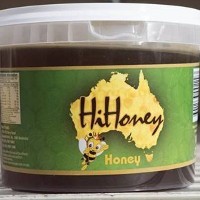

A Melbourne-based importer of Mediterranean and Middle Eastern foods has been stung with a $10,200 fine for stocking a fake honey product named Hi Honey.
Bera Foods is the latest company to be fined over fake honey products, after Victoria Honey was smacked with a $30,000 penalty for similar allegations in June.
The company paid the penalty following the issue of an infringement notice by the Australian Competition and Consumer Commission for stocking the sweetener Hi Honey, which features the word “honey” next to a picture of Australia on its label.
The ACCC found the label misrepresented the product as Australian honey, when in fact the product was predominantly composed of plant sugars and was produced in Turkey.
“The ACCC was concerned in this case because although ‘Hi Honey’ was labelled as honey, the product was not actually honey produced by honey bees. Honey suppliers must ensure any products they sell as ‘honey’ are in fact produced entirely by honey bees,” ACCC Commissioner Sarah Court said in a statement.
Bera Foods general manager Ibrahim Ozdamar told SmartCompany when Bera Foods received the notice from the ACCC, it had already cleared all its stock of Hi Honey and was not planning to purchase any more.
“We stopped importing that a long time ago,” says Ozdamar. “We never imported it again because we don’t like the product quality itself.”
Ozdamar says there are still several importers selling the product in Australia and says it’s up to the ACCC to also find out those stockists. He says he believes the watchdog was “under pressure” from Australian honey producers.
Sally Scott, partner at Hall & Wilcox, told SmartCompany the company was stung by the ACCC for two reasons.
“Firstly, in relation to a representation that the honey was made predominantly from bees and, secondly, that it was made predominantly in Australia, neither of which were the case,” says Scott.
“These representations didn’t arise from express statements. They arose from implications from the term honey and the map of Australia.”
Scott says businesses need to ensure that they consider not only words, but also implications from their packaging and other representations to consumers.
“Just because something isn’t expressly said, doesn’t mean it can’t be the subject of a misleading conduct claim. The law looks at the overall impression that consumers would be likely to have,” says Scott.
Scott says this can include the impact of words, colours, pictures and other implications and businesses need to consider the perspective of consumers, not their staff with their own expert knowledge.
Scott says the ACCC has certainly scrutinised the honey industry for some time, and while honey stockists need to be wary, so too do other businesses in the watchdog’s crosshairs.
“Businesses that produce honey should be alert to the ACCC’s focus. Similarly, there are other types of businesses that are getting caught time and time again. Those businesses that operate in the ACCC’s target areas should be particularly vigilant.”
Follow SmartCompany on Facebook, LinkedIn and Twitter.
Image: Sourced from tastyhoney.com


COMMENTS
SmartCompany is committed to hosting lively discussions. Help us keep the conversation useful, interesting and welcoming. We aim to publish comments quickly in the interest of promoting robust conversation, but we’re a small team and we deploy filters to protect against legal risk. Occasionally your comment may be held up while it is being reviewed, but we’re working as fast as we can to keep the conversation rolling.
The SmartCompany comment section is members-only content. Please subscribe to leave a comment.
The SmartCompany comment section is members-only content. Please login to leave a comment.